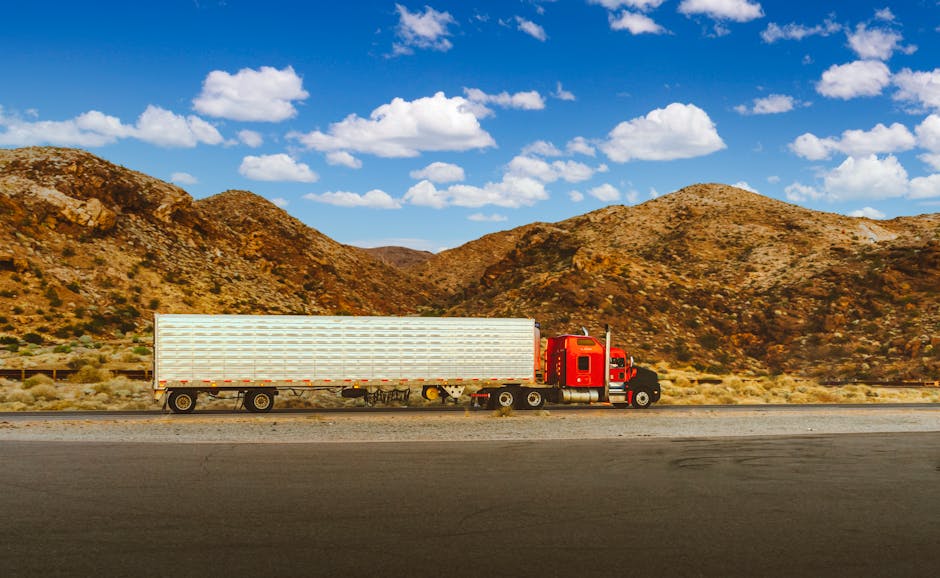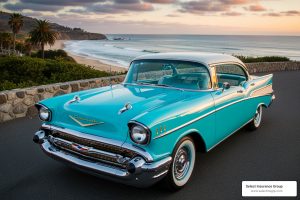Why Truck Liability Coverage Is the Foundation of Your Trucking Business
Truck liability coverage is commercial auto insurance that protects your business when your truck injures someone or damages their property. It’s not just a smart business decision—it’s a legal requirement for most commercial trucking operations.
Here’s what truck liability coverage does:
- Pays for medical bills and lost wages if you injure someone in an accident
- Covers property damage to other vehicles, buildings, or structures
- Provides legal defense if you’re sued after an accident
- Meets federal and state requirements so you can legally operate
- Protects your business assets from devastating lawsuits
The Federal Motor Carrier Safety Administration (FMCSA) sets minimum coverage levels based on your cargo. Most trucks over 10,000 pounds need at least $750,000, while auto haulers need $1 million, and hazmat transporters may need up to $5 million. However, these minimums often aren’t enough to fully protect your business.
Understanding these requirements can be overwhelming. I’m D.J. Hearsey, and for over 30 years, I’ve helped trucking businesses across the Southeast find the right truck liability coverage. My team at Select Insurance Group works with more than 40 carriers to find a policy that fits your operation, whether you’re an owner-operator or running a fleet.
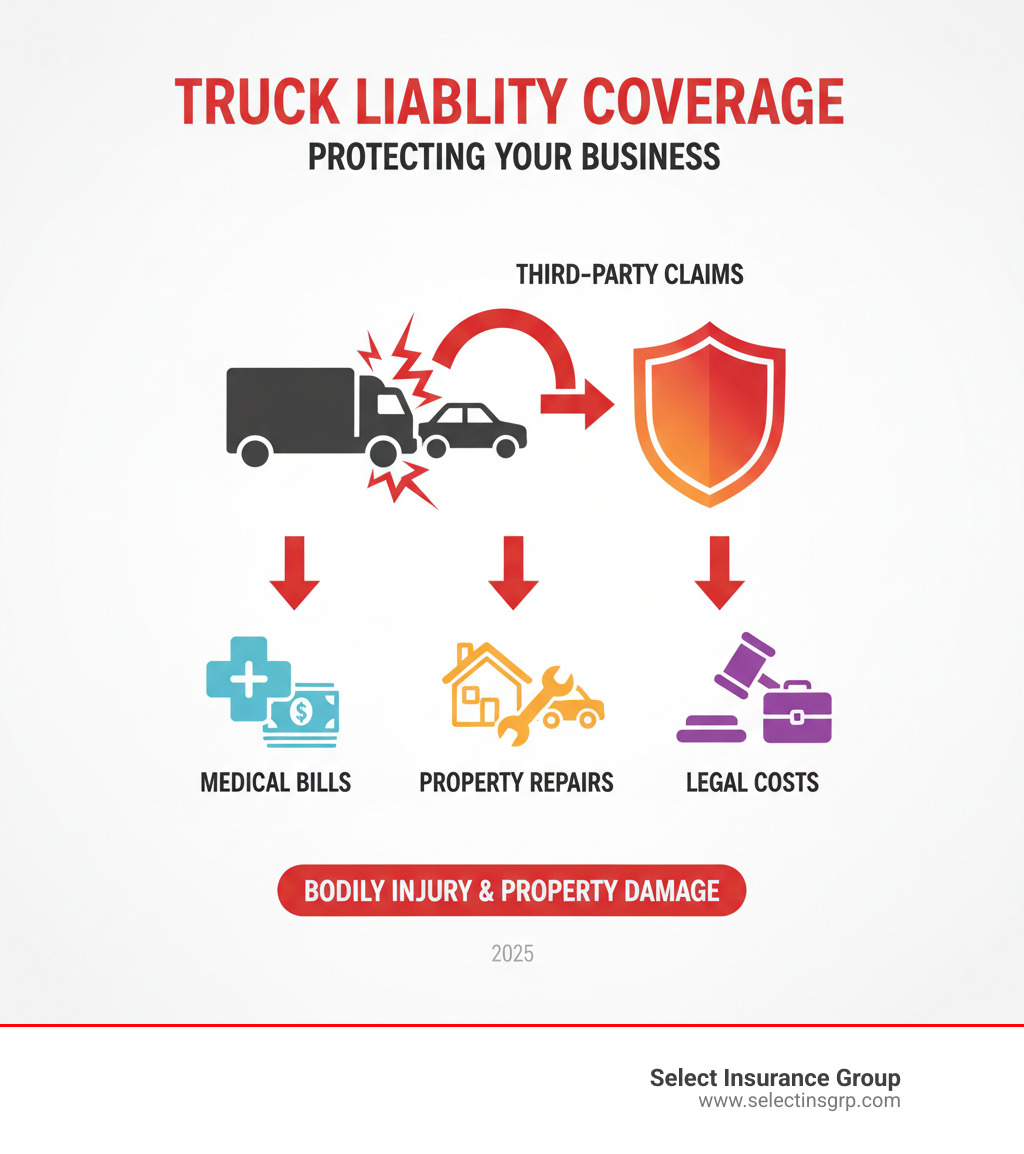
What is Truck Liability Coverage and Why Is It Essential?
Truck liability coverage is the commercial auto insurance that provides financial protection when your truck is at fault in an accident. It’s the safety net for your business when things go wrong on the road.
The stakes are high with commercial trucks. Their size and weight mean accidents can cause severe damage and injuries, making liability coverage a business lifeline.
Your truck liability coverage protects you in two essential ways:
Bodily Injury (BI) Liability covers the human cost of an accident. It pays for medical bills, rehabilitation, and lost wages for anyone injured by your truck. In severe cases, it also covers funeral expenses and pain and suffering, with costs that can easily reach millions.
Property Damage (PD) Liability covers damage your truck causes to property. This includes other vehicles, buildings, road signs, and other structures. Even a minor accident can result in tens of thousands of dollars in property damage.
Beyond paying claims, your truck liability coverage also provides for your legal defense if you’re sued after an accident. Your insurer covers attorney fees, court costs, and settlements or judgments up to your policy limits.
This coverage isn’t optional. The FMCSA legally mandates it for commercial operations, and you can’t haul freight without it. Beyond legality, adequate coverage is essential for business survival. A single major accident without proper insurance could bankrupt your business and force you to liquidate personal assets.
The bottom line? Truck liability coverage isn’t just another business expense—it’s the foundation that keeps your trucking operation secure, compliant, and financially protected when the unexpected happens.
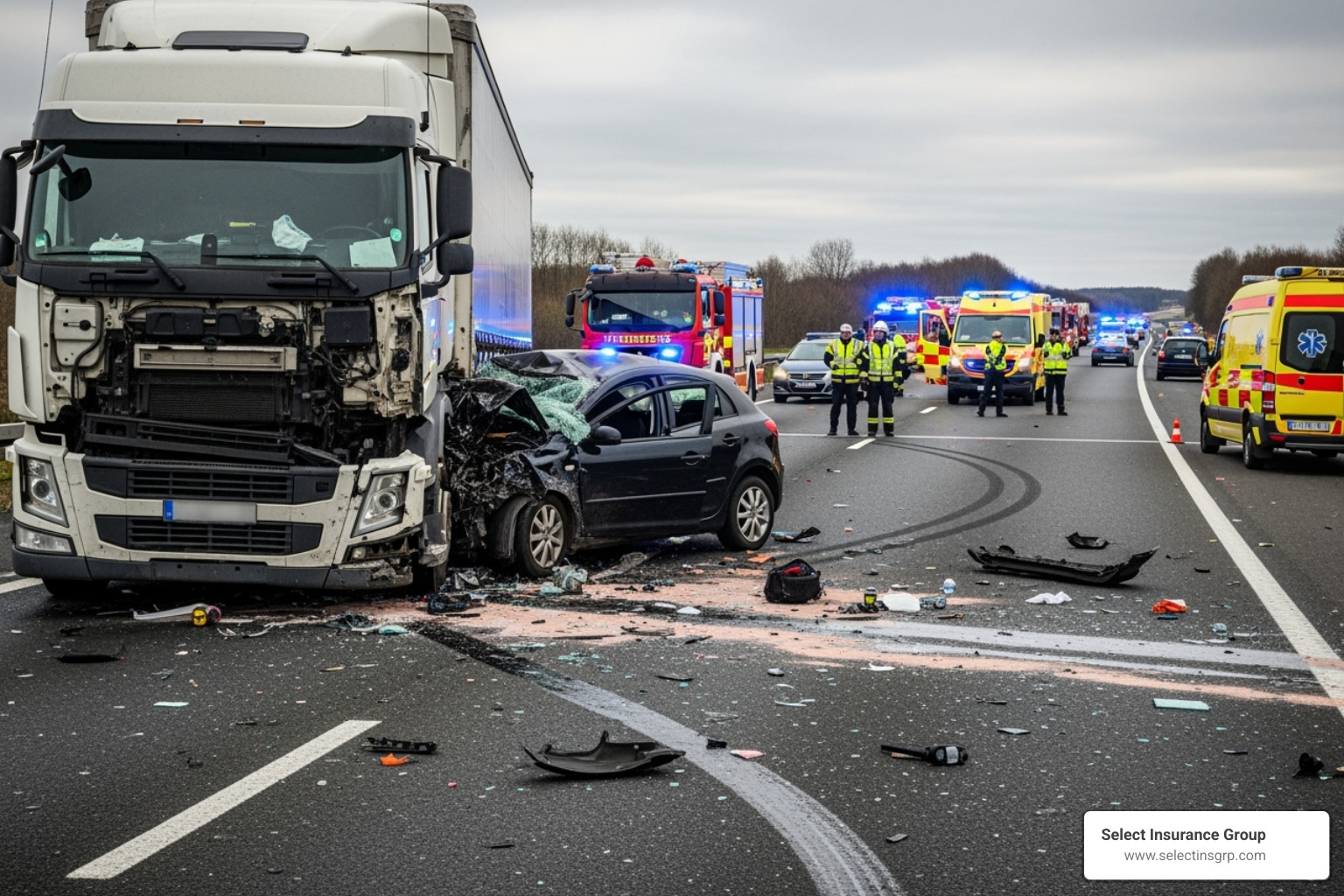
Your Guide to Truck Liability Coverage Requirements
Insurance rules for commercial trucks are far stricter than for personal vehicles. The regulatory framework is set by the Federal Motor Carrier Safety Administration (FMCSA).
The FMCSA sets standards for interstate carriers (those crossing state lines). Intrastate carriers answer to state agencies, but most state rules mirror federal requirements, so understanding FMCSA regulations is key for everyone.
The FMCSA lays out its truck liability coverage requirements in 49 CFR Part 387. These are strict minimums you must meet to legally operate, determined by what you haul and your truck’s weight.
For general freight, trucks over 10,000 lbs GVWR typically need at least $750,000 in liability coverage. The minimum for auto haulers is $1,000,000. This million-dollar limit is becoming an industry standard, as many brokers and shippers require it for all freight types.
For hazardous materials, the requirements are even stricter. Minimum truck liability coverage ranges from $1,000,000 to $5,000,000, depending on the specific substance being transported.
Insurance Filings: Your Proof of Compliance
Having the right coverage isn’t enough; you must prove it to regulators through insurance filings. Your insurer files these documents directly with federal or state agencies to certify you have the required truck liability coverage. Without these filings, the FMCSA will not grant or maintain your operating authority, meaning you cannot legally haul freight.
The primary forms are the BMC-91 (Certificate of Insurance) and BMC-91X (Motor Carrier Surety Bond). Both guarantee to regulators and the public that you have the required liability insurance.
The MCS-90 endorsement is also crucial. Attached to your policy, it guarantees your insurer will pay legitimate third-party claims up to the federal minimum, even if the situation would normally be excluded. It’s a promise to the federal government that the public will be protected.
At Select Insurance Group, we ensure your filings are completed accurately and on time to keep you compliant and on the road. For more on registration, you can find Proof of compliance with the FMCSA on their website.
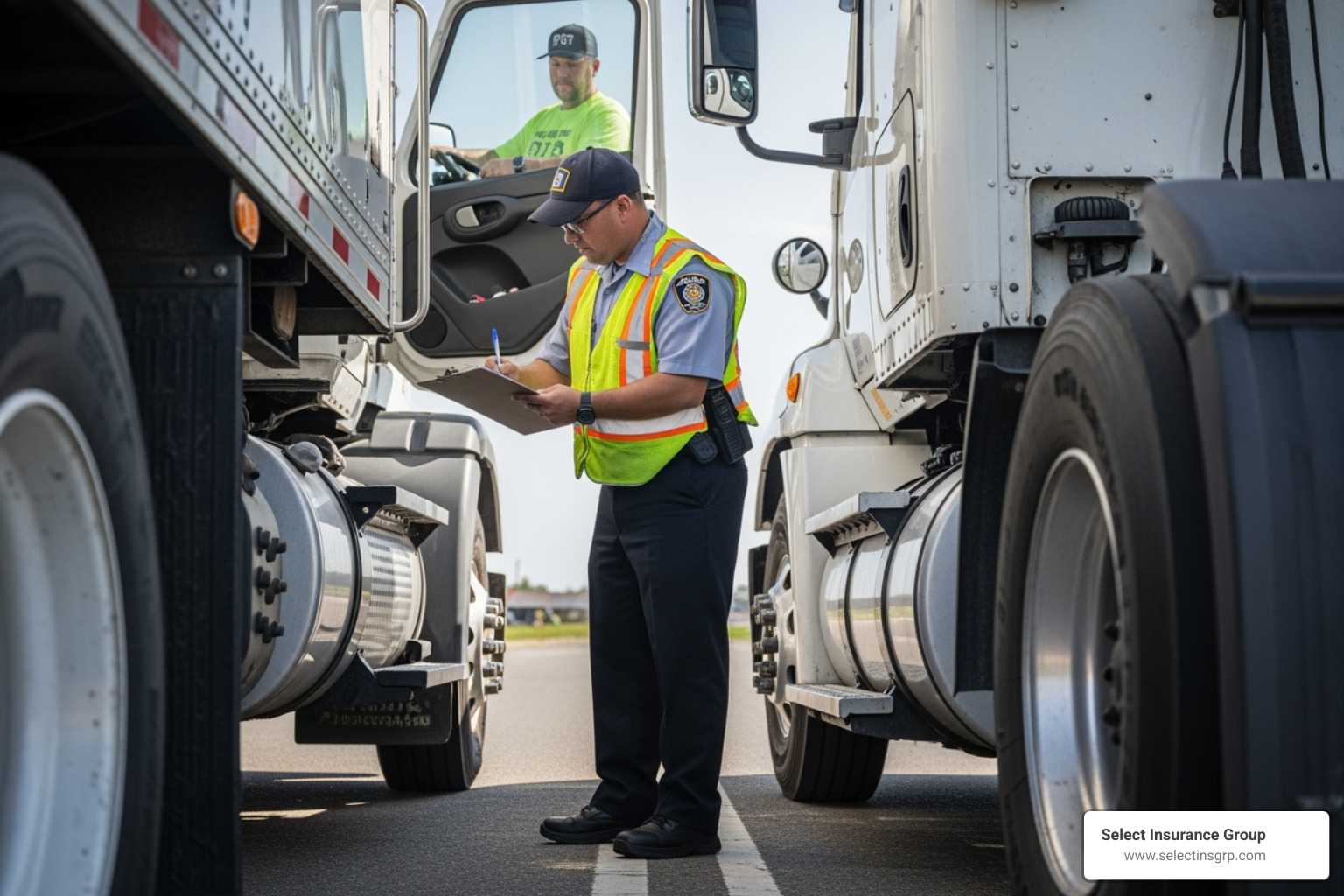
The Full Scope of Your Trucking Liability: Auto vs. General Liability
Many truckers are confused by the difference between Commercial Auto Liability (your primary truck liability coverage) and Truckers General Liability. Both protect against liability claims, but they cover very different situations. Understanding the distinction is crucial for complete protection.
Simply put, Commercial Auto Liability covers you while driving, while General Liability covers other business-related incidents. Here are the key differences:
| Feature | Commercial Auto Liability (Truck Liability Coverage) | Truckers General Liability |
|---|---|---|
| Primary Scope | Accidents involving your truck while driving | Non-driving incidents related to business operations |
| Application | On-road incidents, collisions, vehicle operation | Premises liability, loading/unloading, advertising, personal injury |
| Legal Requirement | Mandatory for all commercial trucks | Optional, but often required by brokers/customers |
| Typical Claims Covered | Bodily injury and property damage from traffic accidents | Slip-and-falls on your property, damage during freight handling (non-driving), libel/slander |
Commercial Auto Liability: The Core of Truck Liability Coverage
This is the mandatory truck liability coverage we’ve been discussing. It covers on-road incidents when your truck is in operation, such as at-fault collisions. This policy handles the financial fallout from traffic accidents, including medical bills, repair costs, and legal fees, up to your policy limits. It’s the non-negotiable coverage that meets federal requirements and allows you to operate legally. However, your business faces risks beyond the road. For more information about how this works in our region, check out our Georgia Business Auto Insurance page.
Truckers General Liability: Beyond the Driver’s Seat
Truckers General Liability is often overlooked but crucial. It covers non-driving incidents related to your business operations. While not federally mandated, many brokers and shippers now require it, and it’s highly recommended for complete protection.
Consider these scenarios: a slip-and-fall at your terminal, or your driver damaging a customer’s warehouse door while loading freight. These are not auto accidents, so your Commercial Auto Liability won’t apply. General Liability is designed for these situations.
General Liability also covers claims like libel, slander, or advertising injury (e.g., using a copyrighted image without permission), which are not covered by your auto policy.
This policy typically covers off-road bodily injury and property damage, personal and advertising injury, medical payments, and damage to rented premises. A standard policy might offer $1,000,000 per occurrence with a $2,000,000 aggregate limit. Premiums for small operations are often a small investment for significant protection.
Without this coverage, you’re exposed to claims from everyday business operations that have nothing to do with driving. It’s protection that might not seem urgent until you need it. We always recommend it as part of a complete protection strategy.
Specialized Types of Truck Liability Policies
Truck liability coverage isn’t one-size-fits-all. Your needs depend on your business structure, such as whether you’re an owner-operator with your own authority or leased to a carrier. These distinctions determine the right policy for you. Here are the main types:
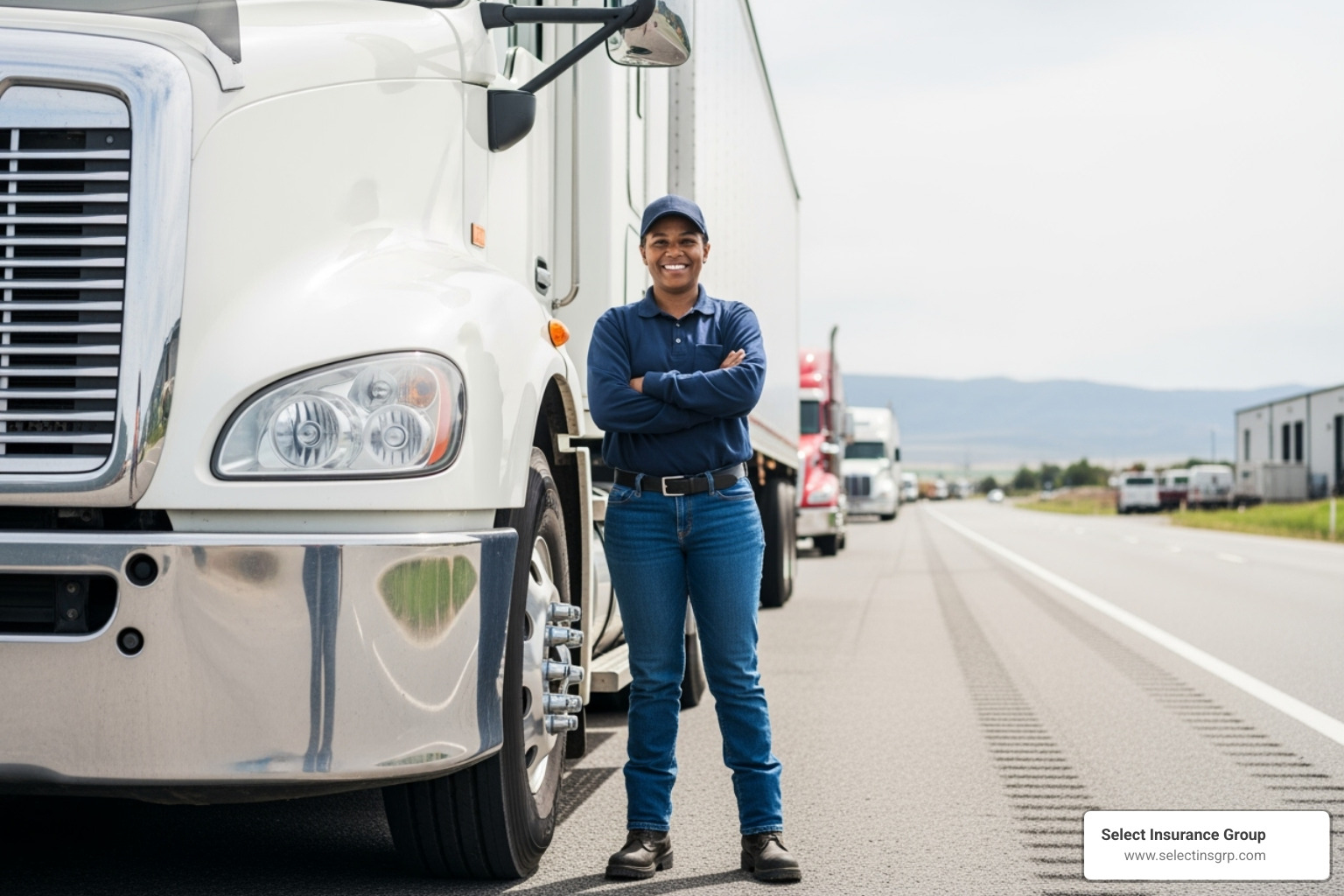
Primary Liability
If you operate under your own DOT authority, you need Primary Liability. This is the standard truck liability coverage that’s active whenever your truck is used for business, whether you’re loaded, empty, or driving for maintenance. It’s the policy filed with the FMCSA to maintain your operating authority, meet federal minimums, and operate legally.
Non-Trucking Liability (NTL)
For owner-operators leased to a motor carrier, the carrier’s primary liability covers you while under dispatch. Non-Trucking Liability (NTL) protects you when using your truck for personal, non-business reasons while off the clock, like grocery shopping or visiting family.
The key distinction is that NTL only covers purely personal use. Any activity that could be considered business-related may not be covered, creating a potential gray area. It’s vital to discuss these specifics with your agent.
Bobtail and Unladen Liability
The terms Bobtail and Unladen Liability are often confused. Traditionally, bobtail liability covers a tractor operating without a trailer. Unladen liability is broader, covering a truck operating without freight, either with an empty trailer or no trailer at all.
Unlike NTL, these can apply when you are still operating for a business purpose, such as driving to pick up a load. Because terminology varies between insurers and modern policies often bundle this protection, review with your agent exactly what your policy covers when you’re not loaded.
In my 30 years of experience, I’ve seen owner-operators caught by surprise in these situations. We ensure our clients understand every scenario to avoid gaps in coverage.
Understanding the Cost and Risks of Your Policy
Let’s discuss the cost of truck liability coverage and the much higher cost of not having enough. While premiums can seem like a burden, my three decades in this industry have shown me that cutting corners on coverage is one of the biggest mistakes a trucker can make.
For detailed insights into commercial auto insurance in our service areas, please refer to our Florida Business Auto Insurance resources.
Key Factors Influencing Truck Liability Coverage Premiums
Your truck liability coverage premium is calculated based on a comprehensive risk assessment by the insurance company. Key factors include:
- Driving Experience: A driver with ten years of clean CDL experience will pay less than a new driver. Accidents, tickets, or a high CSA score will increase your premium.
- Vehicle Type and Age: A new truck with modern safety features may earn discounts, while an older truck may not. The type of vehicle (dry van vs. flatbed) also affects rates.
- Cargo Hauled: Hauling hazardous materials significantly increases premiums. Even general freight varies, with high-value goods costing more to insure than standard commodities.
- Operating Radius: A local operation faces different risks than a long-haul trucker. More miles and driving through congested urban areas typically lead to higher premiums.
- Claims History: A history of multiple claims signals higher risk to insurers and leads to higher rates. A clean record can lower your costs.
- Coverage Limits: Higher limits, like $1,000,000 instead of $750,000, will increase your premium, but the extra protection is often worth the modest cost increase.
- USDOT Safety Record: Your CSA scores, inspection results, and overall FMCSA compliance directly impact your premium. A strong safety record leads to better rates.
Underwriters also consider fleet size, garaging location, safety programs, and business financial stability to create a complete risk profile.
The Dangers of Inadequate Coverage
Choosing minimum coverage to save money is a dangerous gamble. I’ve seen how devastating underinsured claims can be.
A serious accident can generate costs that quickly exceed minimum policy limits. With medical bills, lost wages, and legal fees, claims can easily surpass $1,000,000. If you only have $750,000 in coverage, you are responsible for the rest.
When your coverage runs out, you are personally exposed. This means your business and personal assets—your savings, home, and retirement—are at risk. A single underinsured claim can wipe out everything you’ve built.
A catastrophic, underinsured accident can lead to business bankruptcy, affecting not just you but also your employees and family. The emotional stress and reputational damage from a massive lawsuit are also devastating and can’t be measured in dollars.
The premium for adequate protection is a fraction of the potential loss from an underinsured claim. It’s an investment in your business’s survival.
Choosing the Right Policy and Provider
Choosing the right truck liability coverage is about more than price. You need a partner who understands trucking and provides reliable support.
- Financial Strength: Choose an insurer with a high financial rating (e.g., A.M. Best A+ or A++). You need confidence they can pay a large claim.
- Trucking Expertise: Your agent and insurer must specialize in the trucking industry and its unique risks and regulations.
- Claims Service: A great provider has a reputation for responsive, fair claims handling. Research their reputation before you buy.
- Risk Management Support: The best providers help you prevent claims with safety resources, training, and compliance assistance, which can lower your long-term costs.
Before committing to a policy, ask the right questions. This guide on 8 Must Ask Questions For your Truck Insurance Agent can help. At Select Insurance Group, we shop over 40 carriers to find the right mix of coverage, service, and price. With 30+ years of experience, we work for you to find carriers that will be there when it counts. If you’re in Virginia, explore our Virginia Commercial Insurance options to learn more.
Frequently Asked Questions about Truck Liability
We get a lot of questions about truck liability coverage, and it’s good to take the time to understand what protects your business. Here are the most common ones we hear.
How does the claims process work for truck liability?
Knowing the claims process for your truck liability coverage can reduce stress after an accident. Here’s what to expect:
- Report Immediately: After ensuring everyone’s safety, report the incident to your insurer as soon as possible. Provide all available details.
- Document Everything: Take photos of the scene, damage, and injuries. Get the police report number and witness contact information. The more documentation, the smoother the process.
- Insurer Investigation: An adjuster will be assigned to your case. They will review documents, interview witnesses, and assess damages to determine liability.
- Legal Defense: A key benefit of your policy is legal defense. Your insurer covers attorney fees, court costs, and other legal expenses related to the claim, up to your policy limits.
- Payouts and Resolution: If you are found liable, your insurer will negotiate settlements and pay for damages up to your policy limit, aiming for a fair and efficient resolution.
Cooperation is key throughout this process. Be honest and respond promptly to your adjuster to avoid complications.
What is a Combined Single Limit (CSL)?
When shopping for truck liability coverage, you’ll likely encounter the term Combined Single Limit (CSL). It’s the standard structure for most modern trucking policies.
A CSL provides a single dollar amount of coverage per accident, rather than separate, split limits for bodily injury and property damage. This gives you one large pool of funds for all covered losses.
For example, with a $1,000,000 CSL policy, your insurer can pay up to $1,000,000 for any combination of covered losses from a single accident, including medical bills, property damage, and legal costs. The total payout for that one incident cannot exceed the limit.
This approach is more flexible than split limits, where you could exhaust one type of coverage while having plenty left in another. A CSL ensures the full policy limit is available where it’s needed most for any given accident, which is why it’s the industry standard.
Does my personal auto policy cover my truck for business use?
This is a dangerous misconception. To be crystal clear: No, your personal auto policy will not cover your commercial truck for business use.
Personal auto policies are designed for personal use only and contain explicit exclusions for any business-related activities, especially for commercial vehicles like trucks.
If you have an accident while using your truck for business, a claim on your personal policy will be denied. You would be personally liable for all damages and legal costs, a financially devastating scenario.
Even using a personal vehicle for occasional business errands likely requires a commercial policy, as it’s considered commercial use.
A dedicated commercial auto policy with proper truck liability coverage is not optional for commercial trucks. It is legally mandated by federal and state regulations, required by brokers, and essential for your business’s survival. Operating a commercial truck without the proper policy is a gamble with everything you’ve built. It’s a risk not worth taking.
Conclusion
Understanding truck liability coverage can be complex, but the key takeaway is that it’s more than an expense—it’s the essential safety net for your business.
We’ve covered federal requirements, the difference between auto and general liability, specialized policies, cost factors, and the dangers of inadequate coverage. All these points highlight the need for a robust policy.
Choosing the right truck liability coverage requires an expert who understands both trucking and insurance. With over 30 years of experience, Select Insurance Group helps trucking businesses across the Southeast find proper protection. We shop over 40 carriers to find a solution custom to your specific operation, budget, and risk profile.
Whether you’re an owner-operator or a growing fleet, we provide straightforward guidance to make the process easier. To ensure your trucking business is properly protected, contact Select Insurance Group today for a comprehensive review of your commercial insurance needs. Let’s get you covered right, so you can focus on what you do best—keeping your trucks moving and your business growing.

